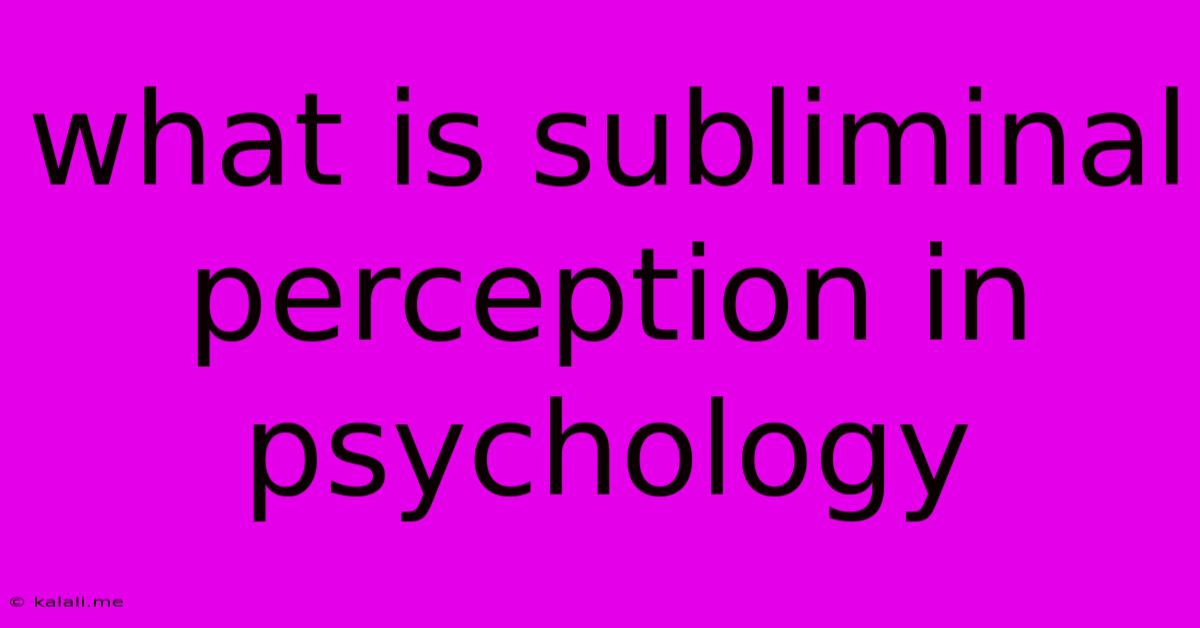What Is Subliminal Perception In Psychology
Kalali
Jun 15, 2025 · 3 min read

Table of Contents
What is Subliminal Perception in Psychology? Unlocking the Secrets of the Unconscious Mind
Subliminal perception, a fascinating and often controversial topic in psychology, refers to the processing of information by our sensory systems without our conscious awareness. It essentially explores the idea that stimuli, presented below the threshold of conscious awareness, can still influence our thoughts, feelings, and behaviors. This article delves into the definition, history, research, and applications of subliminal perception, separating fact from fiction.
What exactly is subliminal perception? Think of it as information processing happening "under the radar" of your conscious mind. This could involve extremely brief visual presentations (flashes of images), auditory stimuli played at low volume, or even subtly embedded messages within other media. The key is that these stimuli are presented too quickly, quietly, or subtly for you to consciously register them. However, the theory suggests that these stimuli can still be processed by your brain and influence your actions, albeit indirectly.
A Brief History of Subliminal Messaging
The concept of subliminal perception gained significant public attention in the 1950s, fueled by claims of its use in marketing. While these claims were often exaggerated or unsubstantiated, they ignited intense debate about the ethical implications and actual effectiveness of subliminal techniques. The infamous "Drink Coca-Cola" and "Eat Popcorn" experiments, conducted during movie screenings, remain prime examples of this era, although their results are highly debated and lack rigorous scientific backing.
Research and Evidence: Separating Fact from Fiction
While early claims surrounding subliminal advertising were largely unsubstantiated, research into subliminal perception continues. Studies have shown that subliminal stimuli can influence various psychological processes, but the effects are generally subtle and short-lived. For instance, studies have explored how subliminal priming (exposure to a stimulus influencing subsequent responses) can affect:
- Attitudes and Preferences: Exposure to subliminal positive words associated with a particular product might subtly increase its appeal.
- Emotional Responses: Subliminal presentation of emotionally charged images could slightly alter mood.
- Behavioral Responses: Research suggests that subliminal cues can influence simple motor actions or choices.
It's crucial to note, however, that the impact of subliminal messages is often weak and highly dependent on various factors, including individual differences, the nature of the stimulus, and the experimental context. Many studies fail to replicate initial findings, highlighting the complexity and limitations of this field.
The Controversy Surrounding Subliminal Perception
The potential for manipulation, often exaggerated in popular culture, is a significant concern surrounding subliminal perception. The idea that powerful hidden messages can subtly control individuals' choices without their knowledge raises ethical dilemmas, especially in advertising and political campaigning. However, robust scientific evidence supporting the claim of widespread, powerful influence through subliminal messaging remains elusive. Many experts caution against overstating the power of subliminal techniques.
Applications and Future Directions
Despite the controversies, research into subliminal perception continues to offer insights into the complexities of human consciousness and information processing. Potential applications include:
- Clinical Psychology: Exploring subliminal techniques in treating phobias or other psychological disorders.
- Cognitive Enhancement: Investigating whether subliminal priming can enhance learning or memory.
- Neuromarketing: While the effectiveness is debated, some researchers explore subliminal methods for gaining insights into consumer preferences.
Ultimately, subliminal perception is a complex phenomenon that requires careful consideration. While it is evident that information can be processed unconsciously, the extent to which this influences behavior is still under investigation. Future research needs to address methodological limitations and focus on replicable findings to better understand the true impact of subliminal stimuli. The field remains a fascinating area of exploration at the intersection of psychology, neuroscience, and marketing.
Latest Posts
Latest Posts
-
Which Of The Following Are Magnifying Lenses
Jun 16, 2025
-
What Is The Si For Volume
Jun 16, 2025
-
How Many Ones Are There Between 1 And 100
Jun 16, 2025
-
The Expected Activity Time In Pert Analysis Is Calculated As
Jun 16, 2025
-
What Is The Square Root Of 313
Jun 16, 2025
Related Post
Thank you for visiting our website which covers about What Is Subliminal Perception In Psychology . We hope the information provided has been useful to you. Feel free to contact us if you have any questions or need further assistance. See you next time and don't miss to bookmark.